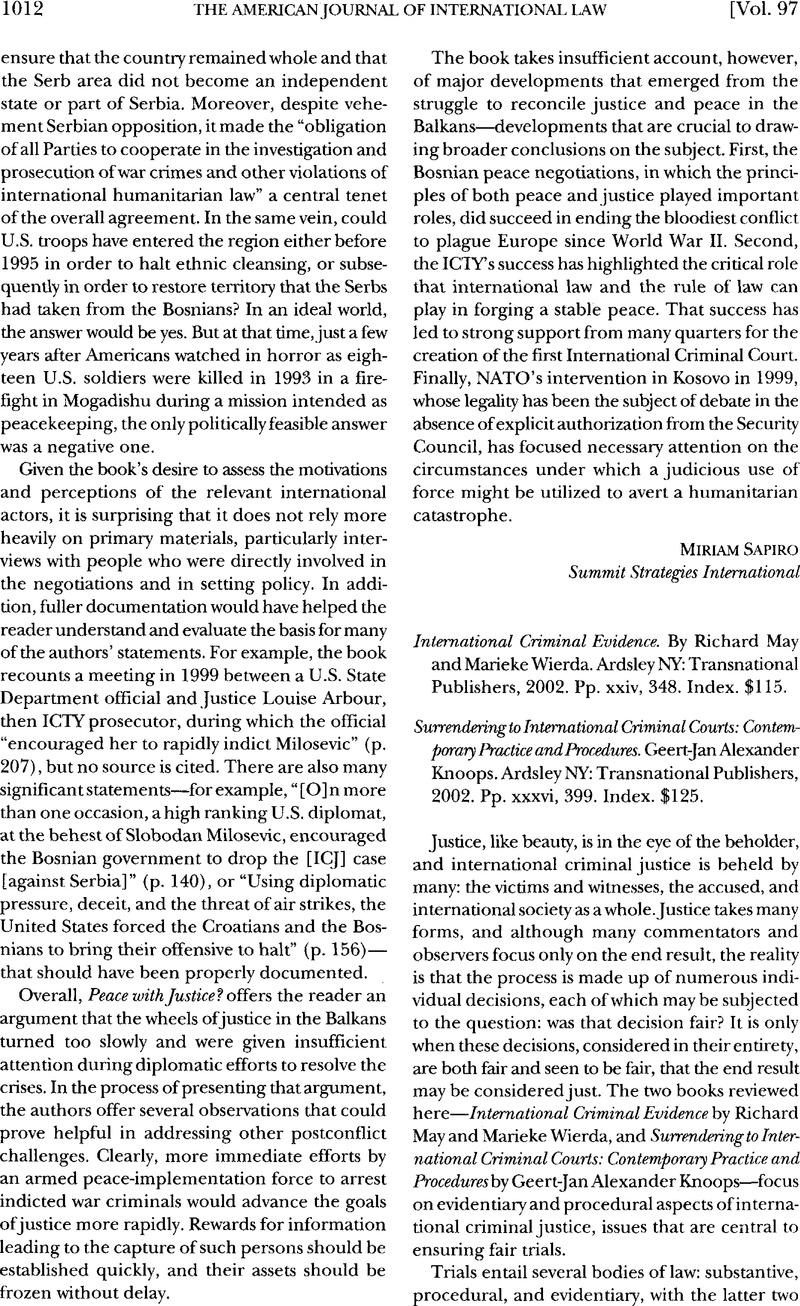No CrossRef data available.
Article contents
International Criminal Evidence. By Richard May and Marieke Wierda. Ardsley NY: Transnational Publishers, 2002. Pp. xxiv, 348. Index. $115. - Surrendering to International Criminal Courts: Contemporary Practice and Procedures. Geert-jan Alexander Knoops. Ardsley NY: Transnational Publishers, 2002. Pp. xxxvi, 399. Index. $125.
Published online by Cambridge University Press: 27 February 2017
Abstract

- Type
- Recent Books on International Law
- Information
- Copyright
- Copyright © American Society of International Law 2003
References
1 See, for example, Rule 89 (“General Provisions“) of Section 3 (“Rules of Evidence“) of the Rules of Procedure and Evidence of both ad hoc criminal tribunals. The basic legal documents and the cases of the International Criminal Tribunals for the Former Yugoslavia (ICTY) and Rwanda (ICTR) are available online at their respective Web sites, http://www.un.org/icty/ and http://www.ictr.org.
2 SeeDaryl A. Mundis, Improving the Operation and Functioning of the International Criminal Tribunals, 94 AJIL 759 (2000).
3 For example, in order to permit the judges to exercise greater control over the proceedings at the ad hoc tribunals, their Rules of Procedure and Evidence were amended several years ago to require the parties, under Rule 65 ter, to file witness lists that include summaries of the facts as to which each witness is expected to testify. Judges are also permitted, see Rules 73 bis (D), 73 ter (C), to order the parties to reduce the number of witnesses if thejudges determine, based on the witness summaries, that the proposed witnesses are cumulative or irrelevant. Finally, in July 2003, Rule 73 bis (D) was amended to permit thejudges, after allowing the prosecution to be heard, to “fix the number of crime sites or incidents in one or more of the charges in respect of which evidence may be presented by the Prosecutor which … are reasonably representative of the crimes charged.” Read together, these rules permitjudges to reduce the scope, and thereby the length, of their trials.
4 See ICTY/ICTR Rule 92 bis (“Proof of Facts Other Than by Oral Evidence“).
5 The terms surrender and transfer, rather than extradition, are used to refer to situations in which a state delivers a person to the custody of an international court. See, for example, Article 102 of the Rome Statute of the International Criminal Court, UN Doc. A/CONF. 183/9 (1998), reprinted in37lLM999 (1998).Thecurrentversion of the Statute is available online at the Court's Web site, http://www.icc-cpi.int.
6 Report of the Secretary-General Pursuant to Paragraph 2 of Security Council Resolution 808, para. 126, UN Doc. S/25704 (1993). In the same report, the secretary- general stated that the Security Council's decision to establish the tribunal created a “binding obligation on all States to take whatever steps are required to implement this decision.” Id., para. 125.
7 See Bert Swart, Arrest and Surrender, in The Rome Statute Of The International Criminal Court: A Commentary 1639,1664-76 (Antonio Cassese, Paola Gaeta, John R. W. D. Jones eds., 2002).
8 Id. at 1676-702 (“Basically, by ratifying the Statute, a State voluntarily accepts the same obligations as are imposed on it by the resolutions of the Security Council creating the ad hoc Tribunals.“).
9 See supra note 5.
10 The principle is not applicable to the ad hoc tribunals. In the Kovacevic case, the ICTY appeals chamber held that the principle “does not apply in relation to the operations of the International Tribunal.” Prosecutor v. Kovacevic, Case No. IT-97-24-AR73, Decision Stating Reasons for Appeals Chamber's Order of 29 May 1998, para. 37 (July 2,1998). Swart, supra note 7, at 1702, criticizes the inclusion of the speciality principle in the Rome Statute.
11 See Article 29(2) of the ICTYStatute, Article 28(2) of the ICTR Statute, and Prosecutor v. Tihomir Blaskic, Case No. IT-95-14-AR108bis, Judgment on the Request of the Republic of Croatia for Review of the Decision of Trial Chamber II of 18 July 1997, para. 26 (Oct. 29, 1997) (“Article 29 imposes an obligation on Member States towards all other Members or, in other words, an ‘obligation erga omnes partes'.“).
12 See Article 15 of the ICTY Statute and Article 14 of the ICTR Statute.
13 Prosecutor v. Tadic, Case No. IT-94-1-AR72, Decision on the Defence Motion for Interlocutory Appeal on Jurisdiction, paras. 31-40 (Oct. 2, 1995).
14 Prosecutor v. Tadic, Case No. IT-94-1-T, Decision on the Prosecutor's Motion Requesting Protective Measures for Victims and Witnesses, para. 28 (August 10,1995) (“The International Tribunal is, in certain respects, comparable to a military tribunal, which often has limited rights of due process and more lenient rules of evidence.“)
15 Luring is the practice whereby deceit, fraud, or trickery is used to entice an accused to leave a jurisdiction that is either unable or unwilling to arrest him, onto territory (or the high seas) where it is possible to arrest him. A number of cases in the United States have accepted the notion that luring does not defeat a court'sjurisdiction. This view is shared by the jurisprudence of the ad hoc tribunals, although a number of national jurisdictions take die contrary view.
16 See, for example, Prosecutor v. Dokmanovic, Case No. IT-95-13a-PT, Decision on the Motion for Release by the Accused Slavko Dokmanovic (Oct. 22, 1997), leave to appeal denied, Case No. IT-95-13a-AR72, Decision on Application for Leave to Appeal by the Accused Slavko Dokmanovic (Nov. 11, 1997) (luring); various pretrial proceedings in Prosecutorv. Todorovic, Case Nos. IT-95-9 & IT-95-9/1; and Prosecutorv. Nikolic, Case No. IT-94-2- AR73, Decision on Interlocutory Appeal Concerning Legality of Arrest (June 5, 2003).




